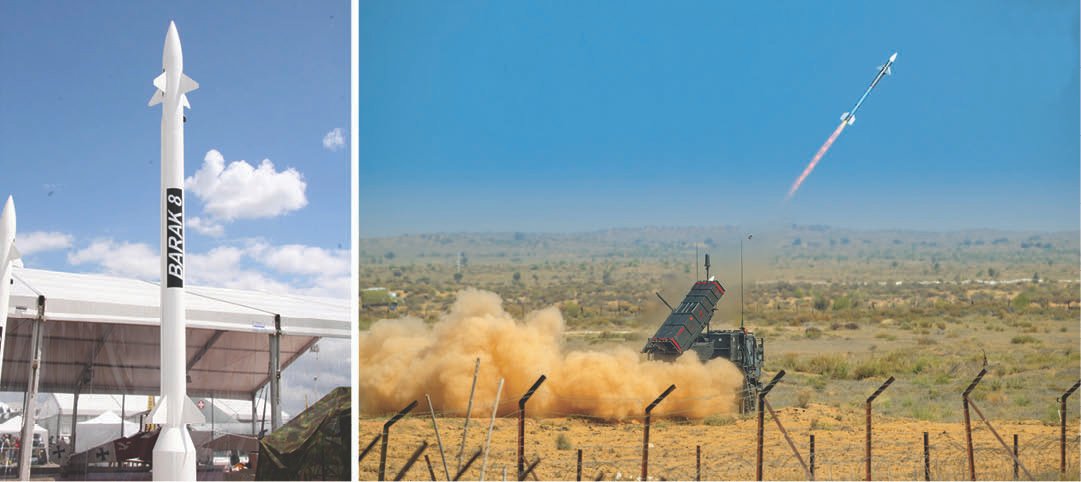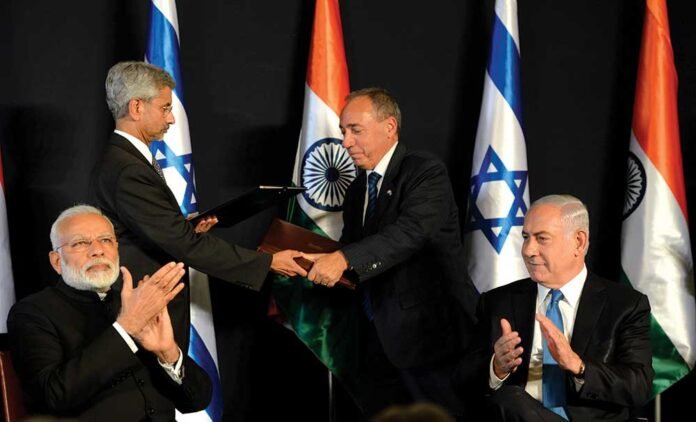India has long been one of the primary markets for the Israeli defence industry. The cooperation spans a wide range of systems and, in line with the “Make in India” policy, involves joint ventures and various forms of collaboration between Israeli and Indian defence companies.
A prime example of this collaboration is the Drishti-10 Starliner. According to a report published in The Tablet by Sameer Patil, Senior Fellow at the Centre for Security, Strategy, and Technology at the Observer Research Foundation (ORF), India, and Deputy Director of ORF’s Mumbai Centre, the Drishti-10 is an Indian-manufactured version of Israel’s Elbit Systems’ advanced Hermes-900 UAV. It is reported to include over 70% local components. Produced by Adani Defence and Aerospace, an Indian defence manufacturer, the drone is scheduled to be inducted into the Indian Navy later this year, significantly enhancing the country’s intelligence, surveillance, and reconnaissance capabilities across the Indian Ocean region. Additionally, the Indian Army has placed orders for these drones, likely for deployment along the Himalayan border with China, where tensions have been ongoing for over three years.
“The production of the Drishti-10 Starliner is symbolic of the thriving India-Israel defence cooperation, which in recent years has become one of the most significant relationships for New Delhi as it deftly manoeuvres the turbulent Middle East and also tackles the China threat on its borders. Driven by the shared threat perception of being surrounded by hostile neighbours and the challenge of terrorism, both countries have emerged as strong partners, particularly in the defence trade,” the report states.
This collaboration received a notable boost in 1999 when India launched an offensive to expel Pakistani troops who had occupied parts of the Kargil region in Jammu and Kashmir. Faced with the difficult task of dislodging the Pakistani forces, the Indian defence forces found themselves in a demanding situation. Israel stepped in by supplying mortars, ammunition, and laser-guided missiles, which added precision and lethality to the Indian military campaign. The Israeli assistance remained steadfast despite significant pressure from Western countries to delay shipments of defence supplies.
‘‘Much of the defence equipment in the Indian inventory remains of Soviet and Russian origin. Over the last decade and a half, however, New Delhi has been consciously diversifying its defence supplies and Israel is among the top arms exporters to India, along with the United States and France. In 2000, India and Israel signed their first defence deal for the purchase of the Barak-1 surface-to-air missile system. As per the available figures from the SIPRI Arms Transfers database, India’s purchases from Israel totalled $4.2 billion between 2001 and 21. Others estimate that India buys $2 billion worth of weapons from Israel annually.’’
India has purchased several significant Israeli defence systems over the years, including the Phalcon airborne early warning and control system, which is installed on Russian Il-76 aircraft. This system is crucial for enhancing surveillance and operational coordination. India has also acquired various unmanned aerial vehicles (UAVs) from Israel, including the Heron, Searcher II, and Harop. These UAVs contribute to intelligence, surveillance, and reconnaissance capabilities in both military and strategic operations.
Additionally, Israel has supplied surface-to-air missile systems like Spyder and Barak, both of which offer advanced air defence capabilities. India’s arsenal is further bolstered by Israeli air-to-surface missiles such as the Popeye I and II, as well as the Spike anti-tank guided missiles. To complement these systems, Israel has also provided a range of sensor systems that enhance the effectiveness of the country’s defence operations, integrating cutting-edge technology into India’s military arsenal.
According to Indian researcher Sameer Patil, the defence trade between India and Israel is mutually beneficial, as Israeli equipment has significantly enhanced India’s intelligence, surveillance, and reconnaissance capabilities. This has been especially crucial in areas where India faces heightened security concerns, such as along its disputed borders with Pakistan and China.
For instance, the Indian army operates Medium Altitude Long Endurance (MALE) Heron drones, a product of Israel’s cutting-edge UAV technology, for real-time surveillance along the “Line of Actual Control” (LAC) — the de facto border between India and China. This region has witnessed a protracted stand-off between the two militaries since 2020. These drones provide vital intelligence that supports military operations and helps maintain a strategic edge in the region. The use of Israeli surveillance systems has thus bolstered India’s defence posture, making the bilateral trade increasingly important in addressing security challenges along these sensitive borders.
According to a report in The Tablet, Indian Special Forces are equipped with a diverse array of Israeli-made assault rifles, including the Tavor, Galil, and Negev machine guns, as well as the B-300 man-portable anti-tank weapon system. This sophisticated arsenal enables the Indian Special Forces to perform high-precision operations with remarkable tactical flexibility. Notably, during the 2016 cross-border strike targeting terrorist facilities in Pakistan-occupied Kashmir, Indian army commandos employed the Tavor and Galil rifles. These rifles were integral to the success of the mission, underscoring the effectiveness of Israeli weapons in critical operations.
Israel Aerospace Industries (IAI) is at the forefront of supplying advanced defence systems to India, from aerospace to land and maritime sectors. With collaborations such as joint ventures with Bharat Electronics Ltd and subsidiaries like ASI, IAI supports India’s goal of self-reliance under the “Make in India” initiative
Israel’s collaboration with India extends beyond weaponry. Through active participation in India’s Make in India initiative, Israel is contributing to the growth of the Indian defence sector. Launched in 2014, the Make in India initiative aims to enhance India’s defence manufacturing capabilities by encouraging greater involvement from the private sector. Israel’s support of this initiative signals its commitment to strengthening ties with India and meeting the growing demand for advanced military systems in the region. The partnership is also a reflection of Israel’s recognition of the strategic importance of the Indian market within the global defence industry.
“Following a similar model of major American aerospace companies, Israel’s defence industry is currently establishing fruitful partnerships with India’s private sector to boost domestic production. Israeli defence giants IAI, Elbit Systems, and Rafael Advanced Defense Systems have partnered with Indian companies Bharat Forge, Tech Mahindra, Adani Defence and Aerospace, and Tata Advanced Systems to manufacture advanced sub-systems and homeland security systems. As mentioned at the beginning, Adani Defence and Aerospace (a subsidiary of the Adani Group with revenues of $32 billion) and Elbit Systems have joined hands to produce UAVs such as the Drishti-10 Starliner, a variant of the Hermes-900 drone. Reportedly, this is the only facility outside Israel to manufacture this drone system. Reports suggest that more than 20 of the Hermes-900 drones, produced by this Adani-Elbit joint venture, have been exported to Israel for military use.”
The report says that Israeli companies have demonstrated a keen ability to identify and leverage the niche technological expertise offered by their Indian counterparts. For instance, Tonbo Imaging, an Indian company specialising in electro-optics systems, has for many years supplied this advanced technology for IAI and Rafael’s precision-guided bombs.
The report highlights the remarkable collaboration between Israeli companies and their Indian counterparts, specifically focusing on niche technological expertise. For instance, Tonbo Imaging, an Indian company specialising in electro-optics systems, has long been a supplier of advanced technology for Israeli companies such as IAI and Rafael, contributing to the development of precision-guided bombs. This collaboration underscores the effective leveraging of local expertise to enhance the technological edge of both countries in the defence sector.
Brig Gen (Res.) Yair Kulas, the head of SIBAT (the International Defence Cooperation Directorate of the Israeli Ministry of Defence), emphasised the enduring and robust defence partnership between Israel and India. In a conversation with Raksha Anirveda, Kulas stated that the relationship is based on shared values, mutual respect, and a joint commitment to security and innovation. His remarks underline the strategic nature of this partnership, built on trust and collaboration, with a focus on technological advancements in defence.
Rafael, a leader in advanced defence solutions, focuses on technology transfer to India, aligning with the nation’s “Aatmanirbhar Bharat” vision. Through local partnerships, Rafael contributes to India’s growing defence ecosystem with cutting-edge air-defence and missile systems
SIBAT head, Brig Gen Yair Kulas said, ‘‘India continues to be a key partner for Israeli defence industries, and we see great opportunities in working together, including through joint ventures and local collaborations that align with India’s strategic initiatives. The close cooperation between our Defence Ministries has been instrumental in advancing numerous joint projects, strengthening our bilateral defence ties.”
He added, while the global defence landscape is competitive, Israel’s proven technologies and close ties with India ensure that our partnership remains resilient and forward-looking. We are confident that this collaboration will continue to grow, addressing evolving challenges and fostering mutual benefits for both nations.
Israel Aerospace Industries (IAI) is a dominant force in Israel’s defence industry, actively engaging in India’s defence sector. As Boaz Levy, IAI’s President and CEO, notes, IAI has consistently been a cornerstone supplier of strategic and advanced systems to India, spanning sectors such as land, maritime, aerospace, and homeland security. In the last decade, IAI has expanded its collaborations with both public sector undertakings (PSUs) and private Indian firms. This includes integrating advanced systems for India’s Ministry of Defence, in alignment with India’s “Make in India” policy. These collaborations not only focus on providing cutting-edge technologies but also aim to address future defence needs.
In support of local innovation, IAI has established subsidiaries such as ASI and HELA Systems and formed joint ventures with Bharat Electronics Limited (BEL) – BIA, which ensure in-country support for critical defence systems. Through IAI’s local innovation programme, NueSPHERE, the company has partnered with Indian startups, academic institutions, and industry players to develop advanced technologies tailored to India’s requirements. This collaborative approach aligns with India’s self-reliance goals while fortifying the long-term strategic partnership between IAI and India.

At the upcoming Aero India 2025, IAI will present its latest advancements in military aviation, air-defence, missile systems, unmanned systems, special-mission aircraft, radars, and cyber technology. This event will also serve as a platform to explore new opportunities for collaboration and ensure that existing partnerships continue to thrive in the evolving global defence landscape.
Parallel to IAI’s efforts, Rafael is also committed to India’s defence ecosystem. Yoav Tourgeman, Rafael’s CEO, affirms the company’s support for India’s defence sector through strong local partnerships and state-of-the-art technological solutions. Rafael aligns with India’s “Aatmanirbhar Bharat” vision by prioritising technology transfer, fostering indigenous manufacturing, and enhancing local industry capabilities to meet the nation’s security needs.
Elbit Systems, another key Israeli defence company, views India as a strategically important partner. Ran Krill, EVP for international marketing and business development at Elbit, underlines India’s significance both as a market and a collaborator in advancing defence technology. Elbit has built a strong presence in India through strategic collaborations and joint ventures, all aligned with India’s “Make in India” initiative. This initiative, aimed at reducing reliance on imports, is one Elbit fully supports. Krill further emphasises that Elbit’s involvement in India extends beyond mere market opportunity, contributing to the country’s defence self-reliance and economic growth through the export of domestically produced parts.
Orbit Communication Systems Ltd, a leader in airborne and maritime SATCOM systems, has been integral to India’s defence sector for over three decades. Dany Eshchar, President and CEO of Orbit, highlights the company’s field-proven solutions across air, land, and maritime platforms. Orbit’s SATCOM solutions have been instrumental in supporting the Indian Ministry of Defence (MoD), the Indian Navy, the Indian Air Force, and DRDO labs. The company’s systems are deployed on a wide array of platforms, including mission aircraft, rotary-wing aircraft, transport vessels, and unmanned systems. In addition, Orbit’s SATCOM solutions are used for providing communication on the move for armoured vehicles, proving essential for modern warfare scenarios. Orbit’s contributions also extend to ISRO/ISTRAC and other Indian space initiatives.
Elbit Systems has established itself as a key partner in India’s defence preparedness, providing solutions across land, naval, and aerospace domains. By participating in the “Make in India” initiative, Elbit helps India reduce reliance on imports, contributing to both national security and economic growth
“Live demonstration of Orbit Multi-Purpose Terminals (MPT) of Ka Band solution has been made to all wings of MOD, Indian Coast Guard (ICG) and potential customers for meeting the expectations of Indian market which shall soon migrate to Ka band in the year 2025-26,’’ Eshchar added.
These collaborations underline the growing and multifaceted defence relationship between Israel and India, with a focus on technology transfer, innovation, and self-reliance, in line with India’s broader defence strategy.
-The writer is an Israel-based freelance journalist. The views expressed are of the writer and do not necessarily reflect the views of Raksha Anirveda






